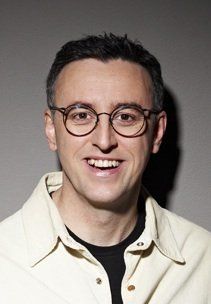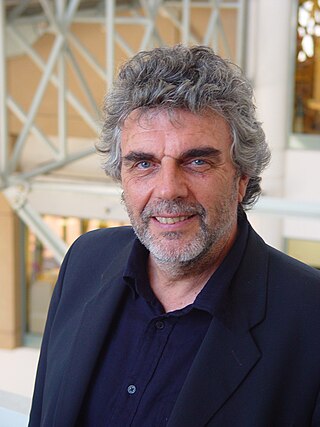
The Fox Broadcasting Company, commonly known simply as Fox and stylized in all caps, is an American commercial broadcast television network owned by the Fox Entertainment division of Fox Corporation, headquartered at 1211 Avenue of the Americas in Midtown Manhattan. Fox hosts additional offices at the Fox Network Center in Los Angeles and at the Fox Media Center in Tempe, Arizona. Launched as a competitor to the Big Three television networks on October 9, 1986, Fox went on to become the most successful attempt at a fourth television network. It is also known to push the boundaries of what could be shown on a broadcasting network, as evident with shows like Married... with Children, The Simpsons, Family Guy, and That '70s Show. It was also the highest-rated free-to-air network in the 18–49 demographic from 2004 to 2012 and 2020 to 2021, and was the most-watched American television network in total viewership during the 2007–08 season.

The Walt Disney Company has produced an anthology television series since 1954 under several titles and formats. The program's current title, The Wonderful World of Disney, was used from 1969 to 1979 and again from 1991 onward. The program moved among the Big Three television networks in its first four decades, but has aired on ABC since 1997 and Disney+ since 2020.

Anthony Francis Martin is a New Zealand comedian, writer and actor, who has had a successful TV, radio, stand-up and film career in Australia.

Countdown was a weekly Australian music television program that was broadcast by the Australian Broadcasting Corporation from 8 November 1974 until 19 July 1987. It was created by Executive Producer Michael Shrimpton, producer/director Robbie Weekes and record producer and music journalist Ian "Molly" Meldrum. Countdown was produced at the studios of the ABC in the Melbourne suburb of Ripponlea. It was screened Sunday night from 6:00pm to 7:00pm.

T. J. Hooker is an American police drama television program starring William Shatner in the title role as a 15-year veteran police sergeant. The series premiered as a mid-season replacement on March 13, 1982, on ABC and ran on the network until May 4, 1985. The show was then picked up for a further single season by CBS.

Soapnet was an American basic cable network owned by the Disney–ABC Television Group division of The Walt Disney Company.

Television in Australia began experimentally as early as 1929 in Melbourne with radio stations 3DB and 3UZ, and 2UE in Sydney, using the Radiovision system by Gilbert Miles and Donald McDonald, and later from other locations, such as Brisbane in 1934.

Rage is an all-night Australian music video program broadcast on ABC TV on Friday nights, Saturday mornings and Saturday nights. It was first screened on the weekend of Friday, 17 April 1987. With Soul Train and Video Hits no longer being produced, it is the oldest music television program currently still in production as of 2023. On Friday and Saturday nights, Rage typically starts between 11:00pm and 1:00am.
Broadcast programming is the practice of organizing or ordering (scheduling) of broadcast media shows, typically the radio and the television, in a daily, weekly, monthly, quarterly, or season-long schedule.
AXS TV is an American cable television channel. Majority-owned by Anthem Sports & Entertainment, it is devoted primarily to music-related programming and combat sports – including boxing, mixed martial arts and professional wrestling.

Anthony Barrell was an English writer and broadcaster who lived in Sydney, Australia. He produced several award-winning radio and television documentaries for the Australian Broadcasting Corporation and the BBC World Service, usually with a focus on Asia and particularly Japan.
Audience Network was an American pay television channel that was owned by AT&T. It featured a mix of original and acquired series, specials, and feature films. The network operated as a commercial-free service and broadcast its programming without editing for content. It was originally exclusive to DirecTV, though it was also added to AT&T U-verse after AT&T's 2015 acquisition of DirecTV. It was also made available on later AT&T streaming efforts, including AT&T TV and AT&T Watch TV, a lower-cost option available to AT&T Mobility customers. As of 2019, the channel had a subscription base of 26 million. The channel ceased operations on May 22, 2020.

ESPN College Football is the branding used for broadcasts of NCAA Division I FBS college football across ESPN properties, including ESPN, ESPN2, ESPN3, ESPN+, ABC, ESPN Classic, ESPNU, ESPN Deportes, ESPNews and ESPN Radio. ESPN College Football debuted in 1982.
A graveyard slot is a time period in which a television audience is very small compared to other times of the day, and therefore broadcast programming is considered far less important. Graveyard slots usually displayed in the early morning hours of each day, when most people are asleep.

ABC Entertains is an Australian English language children's free-to-air television channel owned by the Australian Broadcasting Corporation. It was officially launched by Prime Minister Kevin Rudd on 4 December 2009 as ABC3. It was then relaunched in late 2016 to ABC ME before being relaunched once more in June 2024 as ABC Entertains, now focusing on adult programming

Lost television broadcasts are mostly those early television programs which cannot be accounted for in studio archives usually because of deliberate destruction or neglect.

Futz! is a Canadian animated series created by Vadim Kapridov and produced by 9 Story Entertainment for broadcast on Teletoon. The show's premise revolves around the eponymous main character and his zany adventures. Eschewing verbal dialogue, the series portrays the escapades of this character, who has been described as an anti-hero, in a comedic light.

When the World Health Organization declared the COVID-19 pandemic in March 2020, all major professional and collegiate organizations responded by suspending operations indefinitely. This effect was passed down to the world of sports broadcasting, which includes live coverage of thousands of events on an annual basis through stations and network available over the air, through cable, satellite, and IPTV companies, and via streaming and over-the-top services.













